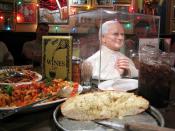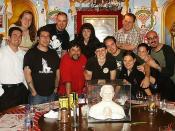The Great Discoveries of the XV Century The Renaissance and the Reform The Great Discoveries of the XV century After the end of the One Hundred Years War, life in France will be transformed by great discoveries: the compass and the printing press. Before the compass, the navigators have only the astrolabe, which allows them to determine the latitude, but not the longitude. Therefore, they don't dare to adventure far from the dimensions, and the voyages throughout the ocean are impossible. But, having the compass, with the needle always pointing to the North, the navigator determines the longitude, and the exploration voyages become possible. Christopher Columbus, leaves his country to find another route to India, country of spices and gold, and he arrives in the Antilles in 1492. He doesn't put his feet on the great continent, which later will be called America (of Amerigo Vespucci's name who also made a transatlantique voyage and brings a map of the dimension of that continent).
Convinced that he has discovered India, Columbus calls the inhabitants <<Indians>>, and the islands of the Antilles are still called in English, <<West Indies>>.
The discovery of America increases the horizon of the Europeans. A little later, French explorers, like Jacques Cartier, searches the dimension of North America, discovering Canada which they call New-France. Canada remains French until 1779, when it falls to the hands of the English. But still today, all the province of Quebec with its big cities, Quebec and Montreal, remain French of language and tradition.
The discovery of the Printing Press It's a German person, Gutenberg, in Strasbourg, who has the idea, in 1440, of a printing system with mobile characters. Until that moment, the books were hand-written, therefore they were rare and very expensive; and because there were not too many...


